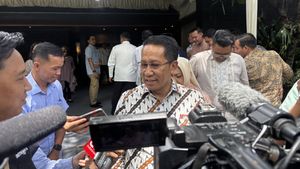JAKARTA - As a global biofarmasi company, PT Glaxo Wellcome Indonesia (GSK) is committed to continuing to encourage innovation and have a positive impact on public health. In Indonesia, GSK has been operating for more than 50 years and we are committed to accelerating and expanding access to innovative medicines and vaccines with the aim of improving the quality of life and health of all levels of society.
Indonesia, with a population of more than 279 million, has major health challenges related to the prevalence of infectious and non-communicable diseases. Contagious diseases account for 21 percent of the death toll, while 73 percent is caused by non-communicable diseases.
Therefore, there is an opportunity to shift focus from financing disease medicine to health investment through prevention, diagnosis, and early treatment, which can improve the health system and reduce future maintenance costs.
As we age, the immune system decreases which makes the elderly more susceptible to infection and disease. Thus, vaccination is one of the important efforts to protect them from preventable diseases, such as lower respiratory infections by the Respiratory Syncitial Virus (RSV-LRTD), smallpox disease or known as Shingles/Herpes Zoster, and Influenza.
In a series of events at the World Lung Congress in Bali, GSK Indonesia, GSK Global Health, and the Ministry of Health of the Republic of Indonesia (Kemenkes) discussed the potential for partnership and collaboration in expanding access and innovation of health services in Indonesia. This aims to support the government's efforts to increase the average life expectancy of Indonesians, in order to exceed the global average, as well as improve Indonesia's position in terms of the innovation index for the health sector.
In addition to vaccination, GSK also supports preventing disease worsening through innovative therapies such as treatment for patients with Kronic Obstructive Lung Disease (PPOK) and Asma, which are expected to reduce hospitalization rates and reduce economic costs due to complications of these respiratory diseases.
Along with efforts to prevent infectious diseases through vaccination, great challenges are also faced by tuberculosis (TB) survivors who often experience chronic lung diseases related to TB known as Post TB-Lung Disease (PTLD).
According to WHO, of the nearly 66 million people who managed to survive TB between 2000-2020, more than half experienced long-term impacts such as PTLD, which is one of the main causes of chronic lung disease. These 4 conditions reduce the patient's life quality with symptoms of respiratory problems and psychosocial problems.
Therefore, prevention through vaccination to reduce the risk of additional infections in patients with PTLD, such as Herpes Zoster and RSV vaccines, is important to help improve quality of life and optimize health service resources in handling tuberculosis.
The development of innovative vaccines is an important step in improving public health, but this must be accompanied by a strong supporting system so that these innovations can be implemented widely and effectively. One of the efforts to improve the capabilities of local researchers in the health sector is through a partnership from the GSK Global Health for the Open Lab Foundation platform, which provides facilities access, international training, and encourages scientific collaboration.
This platform also opens up opportunities for clinical trials to accelerate the development of health solutions that are in line with the needs of the Indonesian people. The government has a great opportunity to strengthen this effort by continuing learning from the pandemic, including increasing the rate of vaccination for adults by facilitating access to vaccines for the community.
Manish Munot, General Manager & President Director of GSK Indonesia, said that GSK has ambitions to continue to have a positive health impact on more than 2.5 billion patients worldwide.
"The best contribution GSK can give in preventing and changing disease travel is through innovation. That's why at GSK, we are developing the largest vaccine portfolio in the industry to help protect all stages of life, from children to the elderly," he said, Friday, December 20.
VOIR éGALEMENT:
Manish added, to have this positive impact, GSK Indonesia has launched at least one product innovation every 6 months throughout 2024 to expand access to innovative medicines and vaccines for patients, including treatment for COPD and Asma, accelerating the availability of innovative vaccines to prevent infectious diseases at all ages, especially for high-risk vulnerable groups such as the elderly (elderly), patients with a history of comorbidities or immunocompromised conditions.
"Hopefully, the Indonesian people can have equal access to innovations such as in developed countries to achieve a better quality of life and can age healthyly," he said.
Indonesia's Health Transformation is now getting closer to being realized. To achieve this vision, close collaboration between governments, policy makers, industries, and academics is the main key.
The English, Chinese, Japanese, Arabic, and French versions are automatically generated by the AI. So there may still be inaccuracies in translating, please always see Indonesian as our main language. (system supported by DigitalSiber.id)
















